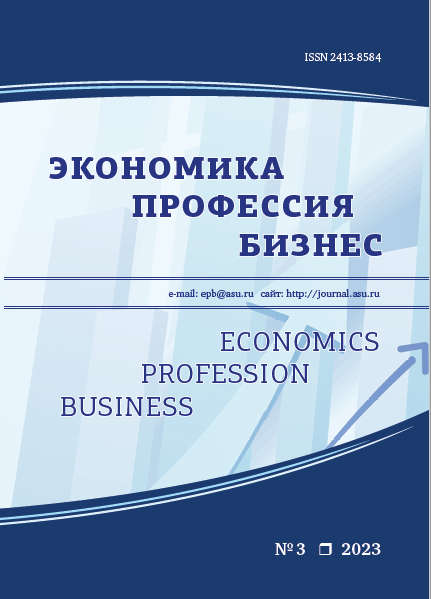DIGITALIZATION OF MANAGEMENT ACCOUNTING WITHIN THE FRAMEWORK OF THE PROCESS MANAGEMENT CONCEPT
УДК 657.1:338.24:004
Abstract
Digitalization of administrative accounting leads to an increase in the efficiency of management in a complex competitive business environment. The growing volume of information and the need for its reliable and timely interpretation contribute to the formation of conditions for the use of digital technologies in order to obtain a clear understanding of business processes and market trends, as well as to make timely strategic management decisions. The purpose of this study was to determine the feasibility and ways of implementing the digital transformation of administrative accounting to improve the efficiency of controlling the movement of inventory. The paper highlights a number of stages of digitalization of administrative accounting and control of the movement of inventory: Stage 1: digital consistency based on the use of smart technologies, cloud infrastructures, automated accounting and distribution tools, stage 2: automation through the use of wireless data transmission, stage 3: forecast implementation, inventory optimization and improvement of supply chain organization, stage 4: strategic partnership with suppliers and customers, stage 5: using artificial intelligence. As part of the process approach, the authors have created an algorithm for modeling effective administrative accounting based on digitalization. This algorithm was the basis for the formation of a modernized model of administrative accounting based on digitalization, including the study of managerial and supporting business processes, as well as continuous monitoring of the model's compliance with business goals and the elimination of “bottlenecks”.
Downloads
Metrics
References
REFERENCES
Chen H., Chiang R. H. L., Storey V. C. Business Intelligence and Analytics: From Big Data to Big Impact. MIS Quarterly. 2012. Vol. 36, No. 4. Рр. 1165–1188. URL: https://www.jstor.org/stable/41703503/ (date of access: 16.05.2023).
Knudsen Dan-Richard. Elusive boundaries, power relations, and knowledge production: A systematic review of the literature on digitalization in accounting. International Journal of Accounting Information Systems. 2020. Vol. 36. Рр. 100441. URL: https://www.sciencedirect.com/science/article/pii/S1467089518301350?via%3Dihub/ (date of access: 16.05.2023).
Arnaboldi M., Azzone G., Sidorova Y. Governing social media: the emergence of hybridised boundary objects. Accounting, Auditing & Accountability Journal. 2017. Vol. 30 (4). Рр. 821–849. URL: https://www.emerald.com/insight/content/doi/10.1108/AAAJ-07–2015–2132/full/html/ (date of access: 16.05.2023).
Granlund M., Mouritsen, J. Introduction: Problematizing the relationship between management control and information technology. European Accounting Review. 2003. Vol. 12 (1). Рр. 77–83. URL: https://research.cbs.dk/en/publications/introduction-problematizing-the-relationship-between-management-c/ (date of access: 16.05.2023).
Porter M. E., Heppelmann J. E. How Smart, Connected Products Are Transforming Competition. Harvard Business Review. 2014. Vol. 92. Рр. 64–88. URL: https://hbr.org/2014/11/how-smart-connected-products-aretransforming-competition/ (date of access: 16.05.2023).
Rom A., Rohde C. Management accounting and integrated information systems: A literature review. International Journal of Accounting Information Systems. 2007. Vol. 8 (1). Pр. 40–68. URL: https://research.cbs.dk/en/publications/management-accounting-and-integrated-information-systems-a-litera/ (date of access: 16.05.2023).
Karimi J., Walter Z. The role of dynamic capabilities in responding to digital disruption: A factor-based study of the newspaper industry. Journal of Management Information Systems. 2015. Vol. 32, No. 1. Рр. 39–81. URL: https://www.tandfonline.com/doi/abs/10.1080/07421222.2015.1029380?journalCode=mmis20/ (date of access: 16.05.2023).
Parviainen P. et al. Tackling the digitalization challenge: how to benefit from digitalization in practice. International journal of information systems and project management. 2017. Vol. 5. No. 1. Рр. 63–77. URL: https://revistas.uminho.pt/index.php/ijispm/article/view/3856/ (date of access: 16.05.2023).
Ross J. W., Beath C. M. Beyond the Business Case: New Approaches to IT Investment. MIT Sloan Management Review. 2002. Vol. 43. Рр. 51–59. URL: https://sloanreview.mit.edu/article/beyond-the-business-case-newapproaches-to-it-investment/ (date of access: 16.05.2023).
Kolthof E., Steenwijk E., Verbeeten F. De gevolgen van technologie voor de financiële functie: een analyse op verschillende niveaus. MCA. 2017. Vol. 6. Рр. 16–23.
Frey C. B., Osborne M. A. The future of employment: How susceptible are jobs to computerisation? Technological forecasting and social change. 2017. Vol. 114. Рр. 254–280. URL: https://www.sciencedirect.com/science/article/abs/pii/S0040162516302244?via%3Dihub/ (date of access: 16.05.2023).
Bhimani A., Willcocks L. Digitization, «Big Data'and the transformation of accounting information. Accounting and business research. 2014. Vol. 44. No. 4. Рр. 469–490. URL: https://www.tandfonline.com/doi/abs/10.1080/00014788.2014.910051/ (date of access: 16.05.2023).
Copyright (c) 2023 Алексей Владимирович Платов, Инна Алексеевна Новичкова , Наталия Константиновна Хореева

This work is licensed under a Creative Commons Attribution 4.0 International License.
Economics Profession Business is a golden publisher, as we allow self-archiving, but most importantly we are fully transparent about your rights.
Authors may present and discuss their findings ahead of publication: at biological or scientific conferences, on preprint servers, in public databases, and in blogs, wikis, tweets, and other informal communication channels.
Economics Profession Business (EPB) allows authors to deposit manuscripts (currently under review or those for intended submission to EPB) in non-commercial, pre-print servers such as ArXiv.
Authors who publish with this journal agree to the following terms:
- Authors retain copyright and grant the journal right of first publication with the work simultaneously licensed under a Creative Commons Attribution License that allows others to share the work with an acknowledgement of the work's authorship and initial publication in this journal.
- Authors are able to enter into separate, additional contractual arrangements for the non-exclusive distribution of the journal's published version of the work (e.g., post it to an institutional repository or publish it in a book), with an acknowledgement of its initial publication in this journal.
- Authors are permitted and encouraged to post their work online (e.g., in institutional repositories or on their website) prior to and during the submission process, as it can lead to productive exchanges, as well as earlier and greater citation of published work (See The Effect of Open Access).









